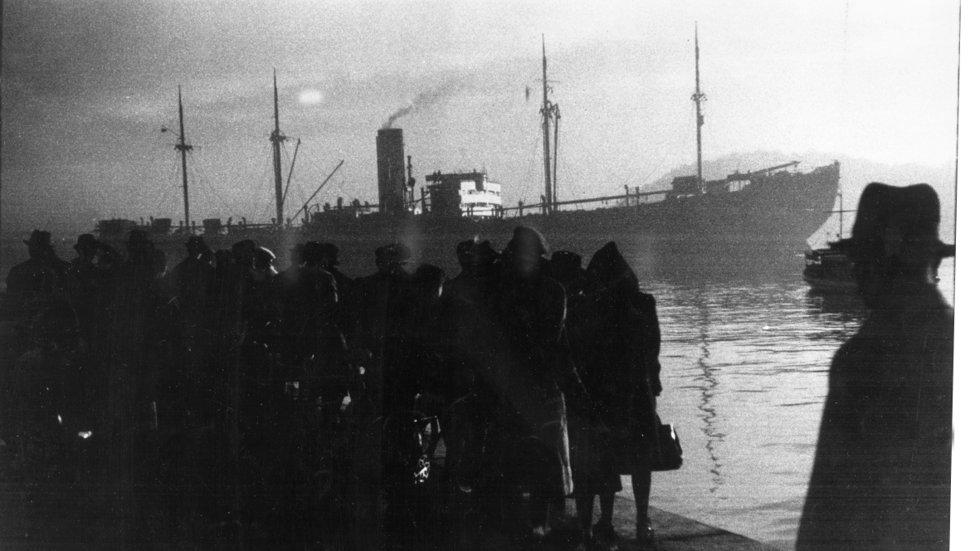On November 26, 80 years ago, the ship D/S Donau left section 1 under the Akershus fortress in Oslo. On board were 529 Jews who were sent to the largest Nazi concentration camp, Auschwitz-Birkenau in Poland. Only nine of them returned alive.
In cooperation with Det Mosaiske Trossamfund, Det Jødiske Samfunn i Trondheim and Jødisk Museum Oslo, the HL Center is organizing a large commemoration in Oslo City Hall on Thursday 24 November, as this year this year falls on a Saturday, which is reserved for Saturdays.
(Article continues below the image)
D/S Donau was sunk at Drøbak in 1945 by war veterans Max Manus and Roy Nielsen. Photo: Per Svensson / NTB
– For us organizers it was important both to remember so as not to forget, and to convey something about Jewish culture and how the Jews managed after the Second World War. During the memorial, memorial culture, history and the situation of Jews today will be thematized, says director Guri Hjeltnes of the Center for Holocaust and Minority Studies (HL-senteret).
Among other things, there will be music, ballet, stage conversation, speeches and other artistic elements. Prime Minister Jonas Gahr Støre (AP) and Rabbi Michael Melchior are among those who will deliver speeches. During the commemoration in 2012, then Prime Minister Jens Stoltenberg apologized to Norwegian Jews.
– Let’s hope it’s a good party. Over 700 people will participate. This is an important national commemoration for many, Hjeltnes says.
National memory
When the Jews arrived at the Auschwitz-Birkenau extermination camp on December 1, 1942, the young men whom the guard company described as able-bodied were taken in as slaves. Women, children and the elderly were sent directly to the gas chamber.
– It is the largest deportation of Jews from Norway ever. December 1, 1942 is the day most Norwegians were killed in World War II. Few know, says historian and professional leader Mads Tangestuen at the Jewish Museum in Oslo.
He hopes November 26 will become one of the dates society associates with World War II and Norwegian history.
– I think there are few people who set the date of a special event in the same way as April 9th and May 8th. When we started celebrating November 26, we wanted it to become a date that people associate with mass deportation. The fact that Jews were expelled from the country and cruelly killed, I think deserves to become part of the national memory, says Tangestuen.
More knowledge
This year, Crown Princess Mette-Marit put the final hurdles at Akershus Fortress. The stumbling blocks are memorials to the Jewish victims of the Holocaust. Each stone represents an individual and says something about, among other things, name, year of birth and date of death. In total, there are 757 stumbling blocks located across the country.
It was the German artist Gunter Demnig who initiated the commemoration project. The Jewish Museum in Oslo brought the project to Norway.
(Article continues below the image)

The stumbling blocks are memorials to the Jewish victims of the holocaust. The stones are thrown into the floor where the Jews lived or worked until they were deported and killed. Photo: Gorm Kallestad / NTB
– We started laying stones in 2010 and this year we laid the last one. It took us twelve years. I think the stones make it easier to connect the incident to the fact that it’s something that happened in Norway, and not very far away, Tangestuen says.
– A lot has happened to our knowledge of the Holocaust in the last 20 years. Knowledge about this day and the deportations increased. After many years of work, interest in the Holocaust has become very large in Norway, says Hjeltnes.
And symbol
A total of 773 Jews were transported from Norway on the three ships Donau, Monte Rosa and Gotenland. Only 38 Jews survived. The Danube remained a symbol of the attempt to exterminate the Jews from Norway.
The vessel Monte Rosa left the Oslofjord on the same day as the Danube with 26 Jews on board.
On 16 January 1945, Danube was scuttled off Drøbak after timed explosive charges that Norwegian saboteurs Max Manus and Roy Nielsen planted below the ship’s waterline detonated. The ship remained with the bow in the air and more than half of the hull remained underwater. In 1952, the vessel was raised and cut up in Bremerhaven.



